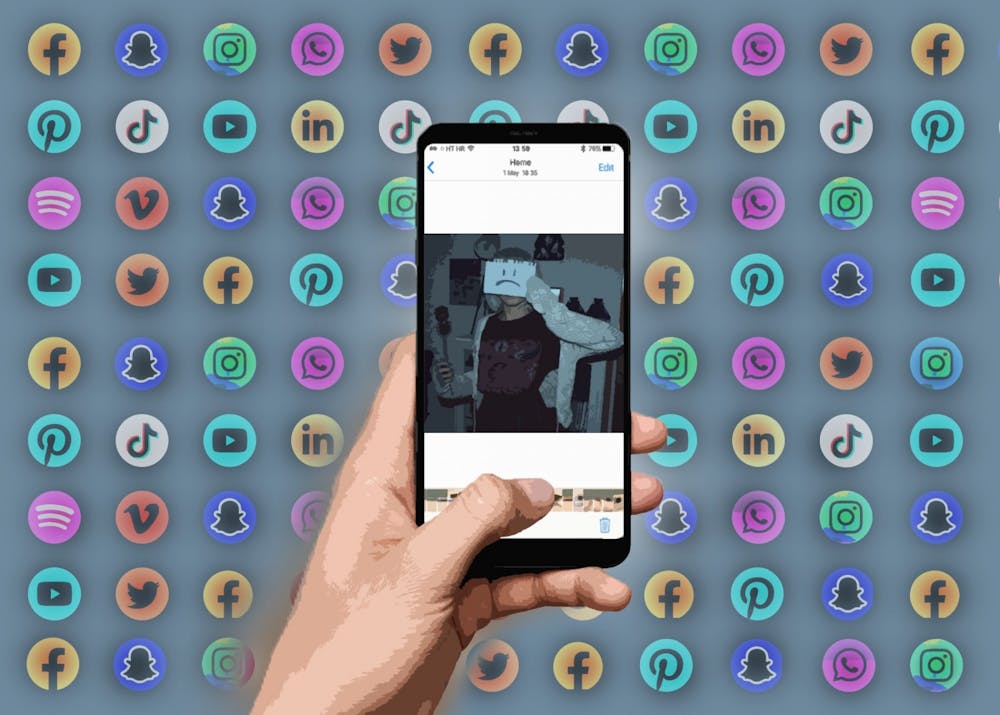Few would deny that the gradual destigmatization of mental illness is a positive development in U.S. culture. Though not perfect, we have worked steadily over the past years to acknowledge how these conditions can be detrimental — and, at worst, debilitating — to the average person’s ability to participate in broader society. Serious mental illness is not something that can be shrugged off. It affects nearly all aspects of life, and it is why institutions like the University have strived to make accommodations for people suffering from mental illness, alongside physical disabilities. But with this growing acceptance comes a new phenomenon — mental illness has become, in certain online circles, trendy. Treating conditions like depression and anxiety as an aesthetic sets a dangerous precedent and risks undermining the progress our society has made thus far towards recognizing the seriousness of mental illness.
Take one glance at your social media feed — Twitter, Instagram or TikTok — and you will most likely find prime examples of the sad aesthetic. Playlists on Spotify titled things like “sad girl starter pack” provide a soundtrack to read sad tweets from accounts dedicated to producing this genre of content. This particular form of self-expression dates back to the Tumblr and Pinterest mid-2010s era of the “sad girl,” referring to a subculture on social media drawn to darker aesthetics and deeply sentimental quotes. We are swamped in an online culture that romanticizes negativity. Consequently, we have turned sadness or nervousness from something to hide into something to flaunt. Talking about your negative emotions is not a bad thing, of course. But this obsession with self-deprecation and misery goes beyond destigmatization — it makes it performative. This sad aesthetic filters depression and anxiety into something inherently inauthentic, perhaps through the fact that it is experienced so communally online. The shared space provided by social media can in fact provide a platform that amplifies the things that make mental health so damaging in the first place.
It is important to note that there is a clear distinction between online support systems, and the glamorization of mental illness online. Support systems in digital spaces like community forums can be immensely helpful for those afflicted with mental illnesses, especially if they have trouble finding resources or people to talk to in their daily lives. But the prevailing belief online seems to be that being depressed is, in its own way, desirable. Through this framework, depression and anxiety are identity markers, labels that set you apart from the rest. Having a mental illness makes you special and unique. It makes you deeper and more introspective. It makes you more self-aware. This is closely tied to the myth of the “tortured artist” — where suffering is an essential ingredient to crafting genius. Images like these do not encourage those with depression or anxiety to work through their struggles. Instead, they trap the depressed or anxious person in their pain and discourage healing. At worst, such romanticization can actually reinforce negative effects of depression and anxiety, resulting in a mental health spiral that is exacerbated within an echo chamber.
Viewing depression, anxiety and other mental illnesses as trends downplays just how damaging these conditions can be. When being sad is conflated with clinical depression, or being nervous is conflated with generalized anxiety, society diminishes the weight of such claims. People are quick to like and share posts that discuss symptoms of depression like lethargy or hopelessness. But these same people will respond with disgust or judgment when they hear about lesser-known aspects of mental illness, like neglecting to shower or brush your teeth for weeks. We must approach mental health disorders with empathy, even when their effects fall outside of the conventions of normal behavior — and characterizing depression and anxiety as something common makes it harder for us as a collective to do this.
Sad culture in digital spaces is more often than not a call for attention. Rarely does it touch on actually bettering oneself, or taking the medical steps required to mitigate the symptoms of mental illness, such as therapy or antidepressants. Even when they are mentioned, however, the aesthetic framework still adds to the manufactured appeal of such disorders. Therapy is a fun venting session. Antidepressants are cute little happy pills. Users on social media platforms today — most prominently on Tiktok — have gone one step further and popularized the self-diagnosis of mental illness. While self-diagnosis can be useful in leading individuals to seek further help, and TikTok itself has played a valuable role in raising awareness of these conditions in the first place, young people cannot be expected to draw such consequential conclusions about themselves without the opinion of a trusted professional. Self-diagnosing conditions like ADHD, OCD, autism and even Tourette syndrome can dilute online communities with false diagnoses and spread misleading information — especially if they are only claiming their mental illness to seem quirky and different.
Mental health is a tricky topic to navigate. We must exercise caution in the way we discuss not only mental illness, but mental well-being in general. Promoting the sad aesthetic will only make these conversations unproductive, by muddying the waters of what should and what should not be taken seriously. In an online world where influencers sell “Anxiety Queen” merch while preaching so-called self-love, it is part of our obligation as college students — and young people — to consider the implications of such a development in digital spaces. Culture shifts are hard to instigate, but they start somewhere. We must avoid promoting this norm and instead invite discourse that engages in real mental health awareness — not the shell of it that exists online.
Samantha Cynn is an Opinion Columnist who writes on Politics for The Cavalier Daily. She can be reached at opinion@cavalierdaily.com.
The opinions expressed in this column are not necessarily those of The Cavalier Daily. Columns represent the views of the authors alone.







